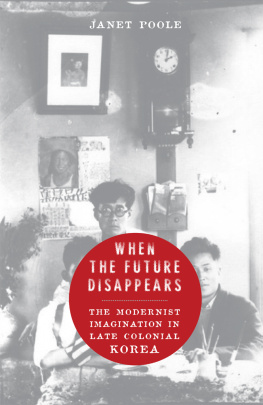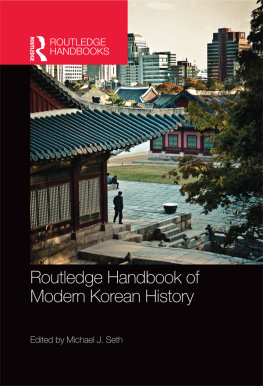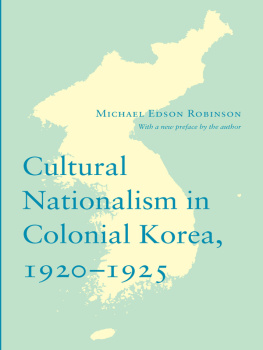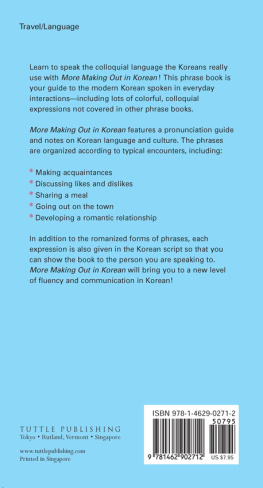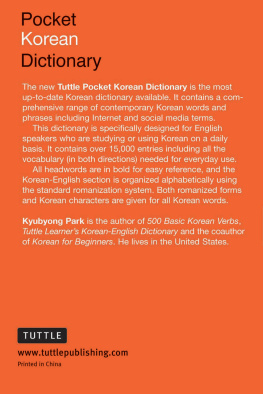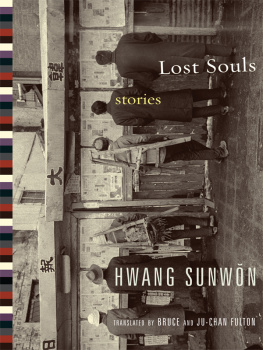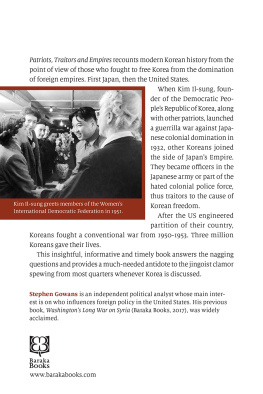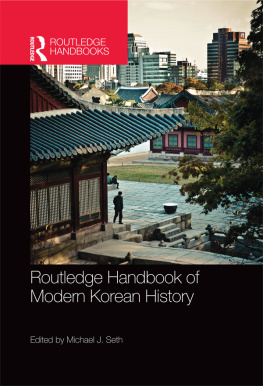
Studies of the Weatherhead East Asian Institute, Columbia University
The Studies of the Weatherhead East Asian Institute of Columbia University were inaugurated in 1962 to bring to a wider public the results of significant new research on modern and contemporary East Asia.


COLUMBIA UNIVERSITY PRESS
PUBLISHERS SINCE 1893
NEW YORK CHICHESTER, WEST SUSSEX
cup.columbia.edu
Copyright 2014 Columbia University Press
All rights reserved
Library of Congress Cataloging-in-Publication Data
Poole, Janet, author.
When the future disappears : the modernist imagination in late colonial Korea / Janet Poole.
pages cm (Studies of the Weatherhead Institute, Columbia University)
Includes bibliographical references and index.
ISBN 978-0-231-16518-1 (cloth : acid-free-paper)ISBN 978-0-231-53855-8 (e-book)
1. Korean literature20th centuryHistory and criticism. 2. Modernism (Literature)Korea. 3. Colonialism in literature. 4. Postcolonialism in literature. 5. Language and languages in literature. I. Title.
PL957.5.M63P66 2015
895.709112dc23
2014009491
A Columbia University Press E-book
CUP would be pleased to hear about your reading experience with this e-book at .
Cover Design: Jordan Wannemacher
Cover Image: Courtesy of Chang Jae Lee
References to websites (URLs) were accurate at the time of writing. Neither the author nor Columbia University Press is responsible for URLs that may have expired or changed since the manuscript was prepared.

As I was writing this book there were moments when I felt as if I had created my own disappearing future, so stubbornly did the book refuse to be finished. Now that I can finally experience something close to the sense of an ending, I thank everyone who made the writing of this book possible, and sometimes even pleasurable. Yi Taejun liked to believe that writing blooms from the individual alone, and sitting at the keyboard day after day can feel like a lonely enterprise to be sure. But I appreciate now more than ever how utterly mistaken he was.
Although this is not my dissertation, some of the research and questions I explore here stem from my work in graduate school. I thank my exemplary committee members for their help and support: Paul Anderer, Charles Armstrong, Harry Harootunian, Hwang Jongyon, and Tomi Suzuki. Harry Harootunian has been nothing short of an inspiration with his endless curiosity, enthusiasm, and encouragement. But, more than that, his work on interwar modernism in Japan offered me both a guide and a challenge to map the constellations of modernism in colonial Korea. Hwang Jongyon has always patiently answered all manner of questions, both large and small. I consider myself extremely lucky to have met him so many years ago. Carol Gluck taught one of the first seminars I attended at Columbia and made me realize for the first time that I could be a writer. She has continued to support me in the best ways possible ever since.
During a long period in Seoul I received more help than I ever deserved. In particular I thank all the members of Kim Chuls fascism seminar: Baek Moon Im, Cha Seung-ki, Kim Chul, Kim Hyun-Joo, Kim Ye-Rim, Kwon Myoung A, Lee Kyoung-Hoon, Shin Hyung-ki, and all the other participants who introduced me to the study of colonial era literature. I have been a poor correspondent since I returned to North America, but I hope I can repay their help one day. Lee Jaeson took me in when I first went to Seoul, seeing me through a last minute bureaucratic wrangle that threatened to upset my work before it even began. Kim Jae-Yong sent me, unsolicited, some vital photocopiesI am very grateful! Meanwhile, Sam Perry kept me motivated through the first stages of research with early morning tennis on the courts at Sogang University, and Suh Jiyoung has always been available for questions and advice.
My happiest memories of grad school are of summer writing retreats on the New Jersey seashore with Laura Neitzel. Through the highs and lows of graduate life I received phenomenal support from Joy Kim, Sarah Kovner, and Leila Wice. At New York University Keith Vincent pushed me further on my engagement with literary texts and was always the best partner for brainstorming syllabi and suggesting books to read. I thank my colleagues from New York University who helped me through my first years of teaching: Rebecca Karl, Tom Looser, Hyun Ok Park, Moss Roberts, Mitsuhiro Yoshimoto, Zhang Xudong, and Dawn Lawson in the excellent library.
In Toronto I have been blessed with a growing community of colleagues whose work inspires me. Andre Schmid has read many of these chapters at different stages, patiently telling me to send the manuscript away. Evie Gu was a particularly strict taskmaster one summer when I was feeling lazy. Linda Feng cajoled me over the finish line. Meng Yue always has a creative spark, while Tom Keirstead, Graham Sanders, and Vincent Shen have been ever supportive chairs. I am glad to work with Jotaro Arimori, Eric Cazdyn, Amanda Goodman, Ken Kawashima, Kyoungrok Ko, Johanna Liu, Hsiaowei Rupprecht, Atsuko Sakaki, Curie Virag, Yiching Wu, and Lisa Yoneyama. Ikuko Komuro-Lee has, always smiling, helped me to negotiate the world of difficult Japanese names, while Yurou Zhong has provided tea and chocolate. Hana Kim is a most supportive librarian. Paul Chin, Norma Escobar, and Natasja VanderBerg have made my work life easy, especially over the final weeks of writing. My enormous gratitude goes to Sungjo Kim, who stepped in at the end and, with the greatest of efficiency, took on the thorny task of obtaining copyright for the images reproduced here. Meanwhile, the many students at the University of Toronto have forced me to understand and articulate the difference between what is important and what does not really matter.
Andrea Arai is always willing to chat late into the night, keeping my spirits nourished and endowing the elsewhere with a special warmth. Henry Em offered much support as I wrote the early chapters. A long time ago Kim Brandt read my dissertation and offered me some pointers at an early point in the process. I am most grateful to the reviewers for the Weatherhead East Asian Institute and Columbia University Press, especially to the anonymous reviewer, who suggested serious revisions. I have tried to follow your advice and only hope that you will consider your reviewing work to have been worthwhile.
I have received much support from Columbia University Press for this work and my translation efforts. I thank Jennifer Crewe for her continued belief in the viability of works in the humanities and translations of Asian literatures. Jonathan Fiedler, Anita OBrien, and Kathryn Schell have been a pleasure to work with. And I am awaiting with great expectation the always fabulous work from the design department. Because the cover arrives at the very end, I did not get to publicly thank Chang Jae Lee for his beautiful cover work on my translation of Yi Taejuns Eastern Sentiments, so I thank him here for designing a book that could match Yis high aesthetic standards. I have received much support too from the Weatherhead East Asian Institute and Dan Rivero, who was so comforting as things threatened to fall apart. I thank you for that.
Next page
